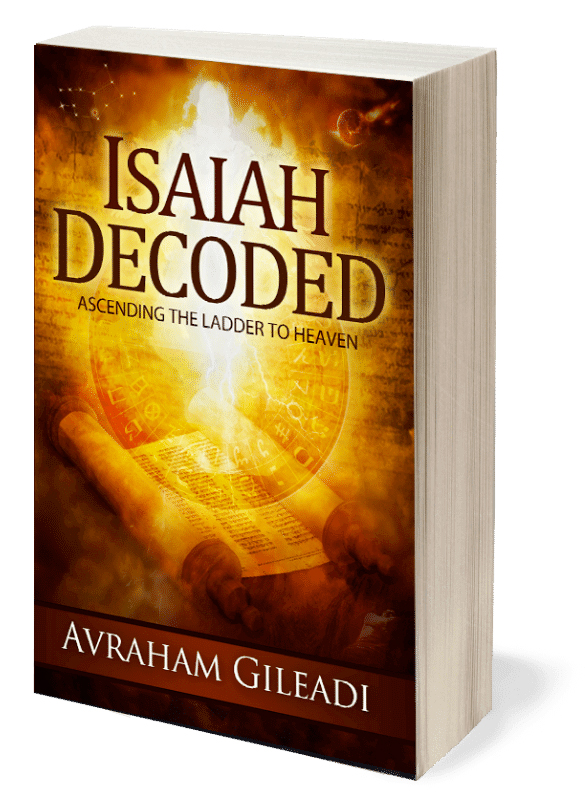Occupying the highest of seven levels in Isaiah’s spiritual hierarchy or ladder to heaven is the God of Israel. As creator of the heavens and the earth, and as re-creator of their human and angelic inhabitants who ascend to higher spiritual levels, he guides their actions by covenanting with them. His overarching design in their creation is to bless and exalt them.
Isaiah 45:12It is I who made the earth and created man upon it; I with my hand suspended the heavens, appointing all their host.
Isaiah 40:28–29Is it not known to you; have you not heard? Jehovah is the God of eternity, Creator of the ends of the earth. He does not grow faint or weary; his intelligence cannot be fathomed. He supplies the weary with energy and increases in vigor those who lack strength.
Isaiah 45:18Thus says Jehovah who created the heavens, the God who formed the earth—who made it secure and organized it, not to remain a chaotic waste, but designed it to be inhabited: I am Jehovah, there is none other.
Through his foreknowledge, Israel’s God anticipated Adam’s and Eve’s transgression in the Garden of Eden and humanity’s subsequent fall from grace. He therefore prepared a way for them and their descendants to be saved from the Fall. Without infringing on their agency to choose, he redeemed them as an integral part of a divinely conceived plan.
Isaiah 44:21–22I have removed your offenses like a thick fog, your sins like a cloud of mist. Return to me; I have redeemed you. Sing, O heavens, for what Jehovah has done; cause it to resound, O earth beneath!
Isaiah 43:11–12I myself am Jehovah; apart from me there is no savior. It is I who foretold and wrought salvation, making it known when there was no strange god among you.
In reality, a fallen world formed the optimum environment in which spiritual growth could occur. As God’s children learned to keep the terms of his covenants and ascend spiritually, he could successively re-create them closer to his own image and likeness. The fruits of their righteousness would more than compensate them for their trials in overcoming evil.
Adam and Eve had themselves passed through such a spiritual journey in order for them to inherit Paradise. God’s promise of a new Paradise for their descendants forms a covenant blessing they too may receive by choosing good and rejecting evil. Because God is no respecter of persons, he can “create” or “re-create” them as he did Adam and Eve.
Isaiah 51:1, 3Hear me, you followers of righteousness, seekers of Jehovah: Look to the rock from which you were cut, to the quarry out of which you were hewn. . . . For Jehovah is comforting Zion, bringing solace to all her ruins; he is making her wilderness like Eden, her desert as the garden of Jehovah. Joyful rejoicing takes place there, thanksgiving with the voice of song.
Within the terms of his covenants with his people Israel, God prepared a way not only for humanity to be delivered from the effects of the Fall but also to ascend to the highest heaven. Isaiah shows that the suffering person of Isaiah 53:1–10 is none other than Israel’s God in the act of serving as their Savior and King under the terms of the Davidic Covenant.
Indeed, Jesus is the only person who matches Isaiah’s description of such a proxy savior and the only one who dies as a proxy sacrifice for sin as symbolized by the sacrifice of animals under the Law of Moses. It is therefore self-evident that he is that same King Messiah and Lamb of God who was prosecuted and sacrificed at Passover by Israel’s high priest.
Isaiah 53:4–8He bore our sufferings, endured our griefs, though we thought him stricken, smitten of God, and humbled. But he was pierced for our transgressions, crushed because of our iniquities; the price of our peace he incurred, and with his wounds we are healed. We all like sheep had gone astray, each of us headed his own way; Jehovah brought together upon him the iniquity of us all. He was harassed, yet submissive, and opened not his mouth— like a lamb led to slaughter, like a sheep, dumb before its shearers, he opened not his mouth.
By arrest and trial he was taken away. Who can apprise his generation that he was cut off from the land of the living for the crime of my people, to whom the blow was due?
Isaiah 63:7–9I will recount in praise of Jehovah Jehovah’s loving favors, according to all that Jehovah has done for us, according to the great kindness he has mercifully and most graciously rendered the house of Israel.
For he thought, Surely they are my people, sons who will not play false; and so he became their Savior: with all their troubles he troubled himself, the angel of his presence delivering them. In his love and compassion he himself redeemed them; he lifted them up and carried them all the days of old.
After undergoing an unspeakable descent phase when offering his life as a sacrifice for guilt, Jehovah/Jesus ascended to the Most High God, there to continue his ministry on behalf of humanity. As their proxy Savior under the terms of the Davidic Covenant, he fulfilled to the letter the role of his people’s king—the King of Zion—a royal title he truly earned.
Whereas other proxy saviors merit the physical protection or temporal salvation of those to whom they minister, Jehovah/Jesus merited humanity’s spiritual salvation from which all salvation ultimately flows. Having answered for the transgressions of a fallen humanity, he returns in glory to the earth in his ascent phase to establish his universal reign of peace.
Isaiah 33:22Jehovah is our Judge, and Jehovah our Lawgiver. Jehovah is our King; he himself will save us.
Isaiah 33:17Your eyes shall behold the King in his glory and view the expanse of the earth.
Isaiah 60:19–20No longer shall the sun be your light by day, nor the brightness of the moon your illumination at night: Jehovah will be your everlasting Light and your God your radiant glory. Your sun shall set no more, nor your moon wane: to you Jehovah shall be an endless Light when your days of mourning are fulfilled.

